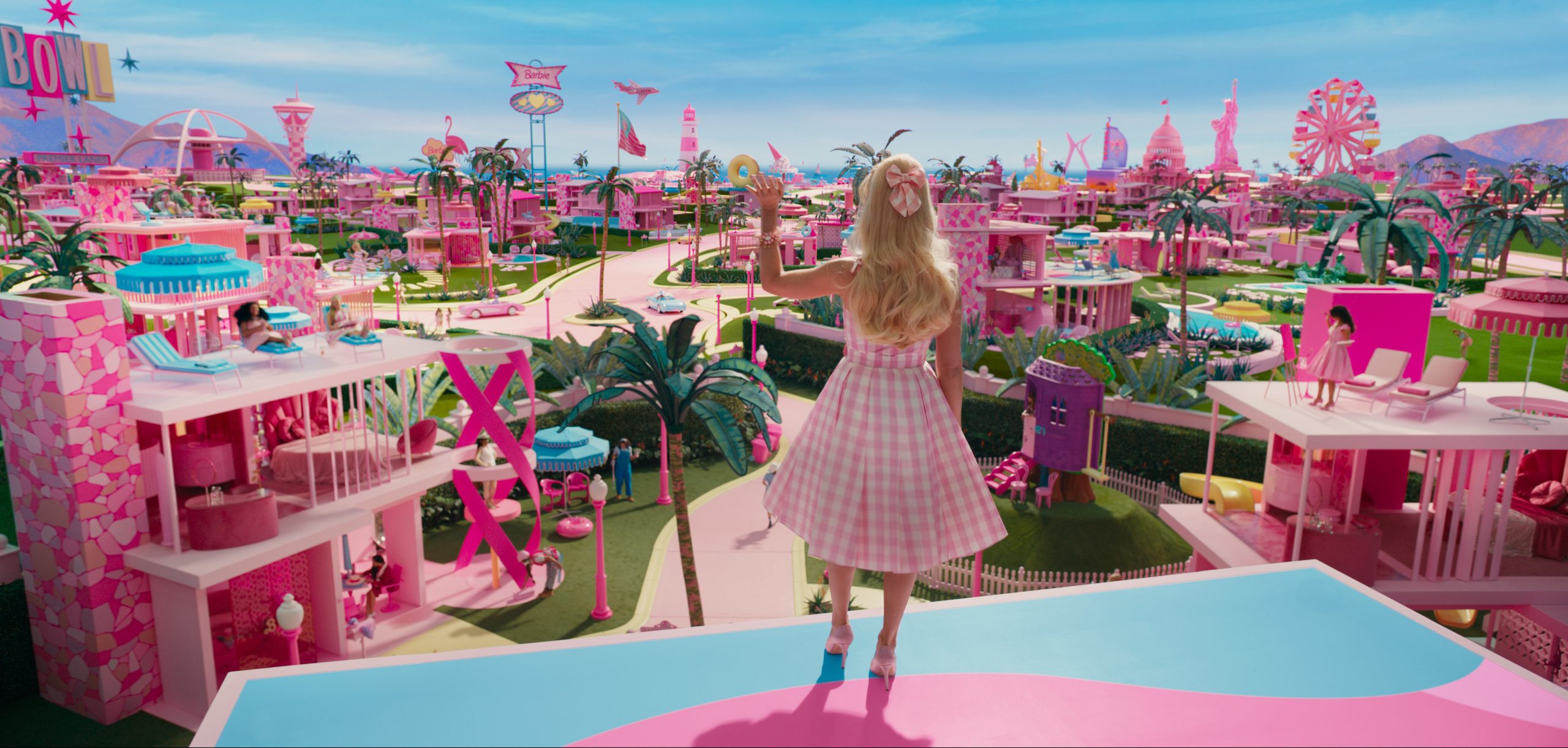When the news that Greta Gerwig was going to co-write and direct a movie based on Barbie the collective response appeared to be a baffled “What?” (Whereas the news that Margot Robbie would be playing the titular doll was greeted with “Oh that makes sense.”) What on earth was a film about the Mattel princess of plastic actually going to look like? What would it be? Would it be for kids? Would it be a comedy? Would it be one of Gerwig’s signature coming-of-age stories? Would it be self-aware? Would it be… feminist? Could it possibly work?
Good news, folks: it works.
In Gerwig’s capable hands Barbie manages to be a comedic, feminist, coming-of-age story that kids absolutely should see as well as many, many appreciative adults. The film opens with Helen Mirren narrating the history of Barbie using the iconic monolith scene from 2001: A Space Odyssey. Before Barbie dolls were mostly made as infants teaching young girls how to be a mother (not as fun as you think), after Barbie (Margot Robbie appearing as the original doll) girls realised they could be anything – or so the denizens of Barbie Land believe. Barbie fixed the world and women were empowered.
Of course the film was never going to be that simple. Barbie Land looks like a pink paradise where a multitude of Barbies run things and Kens, well, they’re there. Perhaps the only place in existence where Adam’s rib doesn’t apply, Barbie Land is a fun-time matriarchy where the multiple Barbies (Issa Rae as President Barbie, Hari Nef as Doctor Barbie, Alexander Shipp as Journalist Barbie, and Nicola Coughlan as Lawyer Barbie – all standouts) validate each other (feelings and logic co-exist and make them worthy), and when they can remember to, give Ken (Ryan Gosling as the Just Ken) a little sunshine. Every day for Barbie is a great day until one day when Stereotypical Barbie realises something is not right. She’s feeling for the first time the notion of death, ageing, cellulite – and worst of all, she has flat feet. She goes to see the only Barbie with any understanding of what could be happening, Weird Barbie (Kate McKinnon) and is informed that somehow, she has opened a portal between Barbie Land and the real world and the fate of Barbie Land rests on her shoulders as she has to track down her original owner and find out what existential crisis she is harbouring that has bled into the fantastic plastic land.
Packing herself into her pink convertible with a stowaway Ken, Barbie makes it to the real world which to her surprise is not the utopia for women that she believed. In fact, it is quite the opposite. Rollerblading in Venice Beach Barbie feels the first tinges of being objectified. For Ken, who was always an accessory to Barbie, he feels the opposite – he is seen and admired which for him is the empowerment he’s been lacking in Barbie Land. It isn’t long until Mattel run by an all-male board headed by Will Ferrell (who wants to be called ‘Mother’) becomes aware they have a situation on their hands. Once a Skipper escaped Barbieland and that was a disaster, the idea that Barbie is out wandering the streets is catastrophic (not so much Ken, because who cares about Ken?) and they need to literally get her back in the box.
Barbie encounters some unpleasant truths in the real world. Not only are women not in charge, they aren’t even equal. Furthermore, the teen Sasha (Ariana Greenblatt) she thought was her owner actively dislikes her and informs her that she set back feminism fifty years with her impossible body standards and consumerist fascism. Barbie is truly lost and when she gets to Mattel Headquarters she finds that she might just be living in a dystopian nightmare. A meeting with the ghost of Ruth Handler (Rhea Perlman) sequestered in the back hallways of Mattel HQ is just one instance where Barbie realises she has to get out of the real world to survive. Thankfully, Sasha’s mother, Gloria (America Ferrera) a low-level Mattel employee with a very strong connection to Barbie is there with a “Get in if you want to live” moment and they head back to Barbie Land to close whatever rift has been opened.
Meanwhile, Ken is having the time of his life as he wanders Century City. He has discovered patriarchy (and horses which are somehow part of the patriarchy) and is determined to bring his new knowledge back to Barbie Land and inform the Kens that they are actually the real bosses.
Gerwig and co-writer Noah Baumbach tread the line between praising and condemning Mattel’s beloved but historically problematic doll. The fact that Gerwig can both pass this film though the Mattel corporate marketing process and make jokes at the expense of the company is wonderfully clever. The marketing for the film has been a phenomenon in itself with pink suddenly becoming the colour de jour and the questions around Barbie, Ken, Midge (Emerald Fennell in the film, always being pushed out of the frame because a pregnant doll is creepy), Allan, discontinued Kens, Skippers, and Barbies are handled with comedic aplomb.
The third act is where it all comes together in a fantastic symphony of philosophy and gender politics with Demy inspired dance numbers, jokes about the bro-philosophy of the newly instated Kendom (Snyder cut, Godfather explaining, mini-fridges, Matchbox 20’s ‘Push’) that has brainwashed the susceptible Barbies to think they should be subservient to Ken. Gloria delivers an impassioned speech about the cognitive dissonance of being a woman which ironically echoes something Amy might have penned in Gone Girl. Being a woman and simply existing is exhausting and no matter what you can never get it right. You can accidentally be a bad mother while trying to be the best mother you can. Your dreams will have to be compromised to survive – it’s the wake-up call the Barbies need to understand what being more than a symbol means.
There is so much going on in Barbie it’s impossible to explain it in all in one review – it isn’t a stretch to say that there will be a thesis or two written about the film. There are so many visual gags and jokes that its dizzying. The supporting cast is bursting with talent from Simu Liu’s competitive Ken, to Kingsley Ben-Adir and Ncuti Gatwa’s gloriously funny Kens (with surprise John Cena as Mer-Ken), and of course Michael Cera being the perfect Allan. There are also some wonderful cameos that should remain unspoiled. Sarah Greenwood’s production design and Jacqueline Durran’s costumes are simply magnificent. The synergy between the writing, performances, design, and direction is spectacular in all the right ways.
Gerwig uses a doll to symbolise the problems with contemporary feminism which is always a thorny subject. Can the genders ever work together if one is an add-on to the other? What kinds of expectations did second-wave feminism set up for women, and has third-wave feminism managed to properly address them? Margot Robbie and Ryan Gosling’s commitment to their roles as stereotypical Barbie and Ken is hilarious with Gosling proving once again his comedic mettle (Crazy Stupid Love and The Nice Guys were not accidents). Robbie is Barbie and it is impossible to imagine any other actor in the role.
So yes, Greta Gerwig has created a coming-of-age feminist self-aware masterpiece in Barbie with a heart of gold that both subverts and matches expectations. Being a girl, being a woman, is never going to be the heaven that we dreamed, nor is being a man. However, if you can find a way to be the authentic, ordinary, self and retain a sense of value in this crazy world, you just might be (K)enough. In Greta we trust.
Director: Greta Gerwig
Cast: Margot Robbie, Ryan Gosling, Ariana Greenblatt
Writers: Greta Gerwig, Noah Baumbach, (based on Barbie by Mattel)



